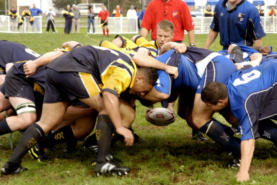Charles
Barstow
Theobald
was
a
Commander
when
he
was
admonished
at
a
court
martial
after
HMS
Gnat
was
wrecked
on
15th
November
1868
off
the
island
of
Balabac
in
the
China
Seas.
While
awaiting
a
posting
to
further
service
at
sea,
he
was
appointed
to
the
Coast
Guard
at
Southend
on
2nd
April
1870.
In
that
year
football
was
played
at
Southend
Park,
near the ‘Cricketers’ in London Road, and known as Milton Hall Ground.
Mr
Theobald
took
an
interest
in
the
lads
playing
there.
He
gave
them
a
set
of
by-laws
and
rules
of
the
game.
They
could
have
been
playing
before
1870,
of
course,
but
the
first
real
evidence of the club’s existence is a copy of the rules dated 1870.
There
were
21
rules
at
the
time
and
they
included:
“No
hacking
is
allowed,”
and
“No
one
wearing
projecting
nails,
iron
plates,
or
gutta-percha
on
the
soles
or
heels
of
boots
shall
be
allowed
to
play.”:
“No
carrying
of
the
ball”
and
“In
case
of
a
disputed
‘touch
down,’
the
decision
rests
with
the
captains
of
each
side
–
the
benefit
of
a
doubt
being
given
to
the
side in whose goal the ball is touched.”
When
Southend
Rugby
Club
was
formed
in
1870
it
was
named
Southend
Foot
Ball
Club.
Records
of
the
club
at
that
time
are
rather
thin.
Members
of
the
Committee
included
Dr
E.
E.
Phillips,
a
local
surgeon,
and
J.
R.
Hemmann,
the
Principal
of
the
local
boys’
school,
St
John’s
College.
With
the
departure
of
the
Naval
support
in
1873
when
Mr
Theobald
was
appointed
to
HMS
Kestrel
and
left
Southend,
Southend
Rugby
Club
became
closely
connected
with
Southend
Cricket
Club
and
played
on
the
same
ground
in
Southend
Park.
Situated
between
Avenue
road
and
Park
Street,
Milton
Hall
ground
belonged
to
the
squire,
Daniel
Scratton.
Mr
Theobald
would later become an Admiral in 1904, a year before his death at the age of 62.
Cricket
had
been
played
there
for
many
years,
and
probably
by
the
Rochford
Hundred
Cricket
club
in
the
18th
Century.
With
the
increase
in
building
activities
the
Club
moved
to
a
ground
near
the
railway
line.
This
must
have
been
the
first
of
a
number
of
ground
changes.
In
1880,
under
the
captaincy
of
J.
C.
Page,
and
with
A.
Stallibrass
as
Vice-Captain,
a
good
crowd
watched
the
Officers
of
the
Royal
Artillery
Shoebury
Garrison
beat
Southend
by
three
tries
and
two
goals
to
nil.
The
team
was
J.
C.
Page,
G.
P.
Birch,
E.
H.
Burton
(who
was
also
secretary),
A.
Stallibrass,
E.
Stallibrass,
E.
Lewis,
E.
Grover,
E.
Harris,
F.
Nelson,
W.
Offin,
W.
Parsons,
A.
Leveaux,
and
E.
Johnstone. Fixtures from that era included clashes with Walthamstow and Upper Clacton.
In
1885,
W.
Lloyd
Wise
became
President,
T.
Crawley
Captain,
and
F.
C.
Smith
Treasurer,
the
first
record
of
club
colours
is
found
at
that
date;
they
were
chocolate
and
white.
At
about
the
turn
of
the
century,
reports
show
that
Southend
opponents
included
Leytonstone,
Chelmsford
and
Blackheath,
Ilford
Wanderers,
Westminster
Bank
and
Willesden.
On
23rd
March
1907
a
match
was
staged
at
Southend
United’s
Roots
Hall
ground
against
Ilford
Wanderers,
Ilford
won
the
match
29
points
to
3,
and
on
30th
March
1907 a match was played at Marine Park, adjoining the Kursaal.
Although
there
is
no
clue
to
attendance
at
games,
the
Club
had
an
agreement
with
the
Kursaal
management
that
50
per
cent
of
the
moneys
paid
at
the
entrance
and
Grand
Stand
was
to
go
to
the
Kursaal,
plus
the
first
£10.
Admission
for
the
Roots
Hall
match
mentioned
was
6d
with
3d
for
soldiers
in
uniform
and
boys.
Ladies
were
admitted
free
of
charge
and
the
Grand
Stand
charge
was
6d
extra.
Minutes
which
survive
from
1907
show
that
on
Friday
17th
May,
at
8.30pm,
a
meeting
was
held
at
Southend
Grammar
school,
over
which
the
President,
Captain
Newman,
presided
and
Mr.
Herbert
took
the
chair.
The
following
officers
were
elected:
Secretary,
Mr
R.
McColla:
Treasurer,
Mr
L.
Smith:
Captain,
Mr
W.
H.
Muncey;
Vice-Captain
and
Hon.
Sec.,
Mr
Westcott:
Chairman
of
Committee, Mr Herbert: Committee, Mr A. H. Manby, Mr P. Manby and Mr Mumford.
At
Subsequent
committee
meetings
held
in
May
and
June
at
Mr
Manby’s
house
in
York
Road,
various
plans
were
laid,
but
all
did
not
go
smoothly
for
those
enthusiasts,
and
one
evening
the
meeting
broke
up
rather
noisily.
It
is
reported
that
some
members
had
to
be
thrown
out
by
Mr
Manby
and
his
brother
“owing
to
a
bottle
of
whiskey
having
been
introduced
and
emptied
by
Irish
members
present.”
At
the
next
meeting,
it
was
proposed
that
drinks
should
be
banned
from
Committee
meetings,
and
the
final
entry
in
the
season’s minutes read: “Thursday 30th June 1907: No members turned up.”
No
further
committee
minutes
survived
until
1919
probably
due
to
inactivity
during
the
1914-18
War,
though
there
is
on
record
a
meeting
in
1911
at
the
Ingram
Club,
when
H.
Cope
was
elected
Secretary,
A.
Hamm
Captain
and
N.
Ayres
Vice-Captain.
The
Chairman
of
the
Committee
was
Rev.
A.
R.
A.
Nicol,
the
presidency
was
later
accepted
by
Rev.
F.
Dormer-Pierce,
the
ground
in
use
then was at Wiffens Farm, near Southchurch Hall School.
On
the
fixture
list
at
the
time
were
London
Devonians,
who
later
amalgamated
with
Wasps,
Molesey,
Saracens
and
Wasps.
Mr
Potter
Irwin,
the
international
referee,
took
charge
of
a
club
match
that
year,
and
he
was
afterwards
a
guest
at
the
first
recorded
Club
dinner.
It
was
in
1912
that
rugby
football
in
the
borough
received
a
“shot
in
the
arm”
in
the
form
of
H.
G.
“Billy”
Williams.
“Billy”
was
appointed
history
master
at
Southend
High
School.
He
rapidly
made
his
mark
in
the
Southend
Club
and
was
Captain
in
1913,
and
again
following
the
War
when
activities
were
restarted.
In
1919
he
was
appointed
the
first
Headmaster
of
the
new
Westcliff
high
school, the school played rugger from the start.
With
the
formation
of
the
Old
Westcliffians
RFC,
“Billy”
became
their
first
President.
While
H.
G.
Williams
was
Captain
in
1913,
Southend
played
their
first
match
at
the
Twickenham
international
ground.
They
were
beaten
by
25
points
to
6
by
the
Harlequins
A
XV. Tries were scored by Leith and Coleman and the forwards are said to have played well.
A
meeting
called
to
restart
the
club
was
held
on
25th
August
1919.
The
Hon.
Rupert
Guinness
was
elected
President,
E.
J.
Bull
Chairman, and on the committee were A. Christie, S. G. Best, N. N. Whitmore, J. W. Youd, A. J. Wilson and H. G. Webb.
A
pitch
in
Priory
Park
near
the
main
entrance,
(affectionately
known
as
the
Slope),
was
obtained
from
the
Corporation.
Teas
were
arranged in St. Mary’s Hall, Prittlewell.
Southend Rugby Club



Southend Timeline Southend-on-Sea © 2009 - 2024. All Rights Reserved



Southend-on-Sea’s No 1 History Website! Documenting The Town & The Townspeople
Now Incorporating The Sea Of Change Website
Website Info:



SOUTHEND CITY
Chalkwell ▪ Eastwood ▪ Leigh-on-Sea ▪ Prittlewell ▪ Shoeburyness ▪ Southchurch ▪ Thorpe Bay ▪ Westcliff-on-Sea
































































